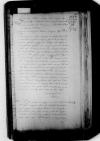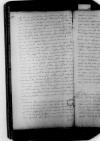List #421
Alfonso de VALDÉS do Ioannes DANTISCUSToledo, 1529-01-16
Regest polski: Valdes stwierdza, że Dantyszek nie ma powodu tłumaczyć się z wyjazdu bez pożegnania, ponieważ ludzie ich pokroju nie powinni przejmować się pustymi ceremoniami. Cieszy go, że Dantyszek liczy na jego pomoc; kocha go nie mniej, niż rodzonego ojca. Epigramat Dantyszka o Lalemandzie spodobał się nie tylko samemu Valdesowi, ale także wszystkim przyjaciołom. Na prośbę Dantyszka Valdes relacjonuje sprawę Lalemanda: został on oskarżony o zdradę tajemnic państwowych Francuzom, samowolne wprowadzenie znaczących zmian w dokumencie przywileju cesarskiego i o kilka innych czynów, godnych najwyższej kary. Początkowo wypierał się, potem, wobec zeznań Ronquillo, przyznał się do części win, jednak nie do zdrady. Jeszcze nie wiadomo, jaką poniesie karę. Ma wielu przyjaciół, którzy próbują go uwolnić, ale także wielu wrogów, zapewne więc nie uda mu się uniknąć kary. Valdes stawia Lalemanda w jednym rzędzie z oszustami, występującymi w żywotach cesarzy rzymskich — Turinusa z żywota cesarza Aleksandra Sewera i Zoticusa z żywota Heliogabala, opisanych także przez Erazma w Adagiach. Zachęca Dantyszka, aby napisał dla Lalemanda epitafium, jeśli uzna za stosowne zaszczycić w ten sposób osobę żyjącą. Valdes zawiadamia, że kanclerz [Mercurino Gattinara] powrócił przed świętem Objawienia Pańskiego [6 stycznia]. Nie ma wieści z Italii ani z innych okolic. Cesarz obstaje przy planach podróży do Italii na wiosnę, mimo że prawie całe jego otoczenie jest temu przeciwne. Valdes zdaje się w tej sprawie na Bożą Opatrzność. Przesyła Dantyszkowi nowe druki dotyczące Francuzów. Wstrzymał druk własnego tekstu, ponieważ czeka na opinię cesarza. Nie dokończył jeszcze dialogu, być może Dantyszek otrzyma go, zanim opuści Hiszpanię. Valdes niecierpliwi się, kiedy Dantyszek prześle mu Pasquillusa i inne swoje teksty. Przekazuje pozdrowienia od przyjaciół, którzy byli niezwykle rozweseleni listem Dantyszka, zwłaszcza od pana regenta [Sigismondo Loffredo?], Longus’a, brata Valdesa Iacobus’a, a także Suares’a. Prosi o pozdrowienie Izabeli [Delgada] i dzieci [Juany Dantisca i Juana Dantisco], chętnie spełni wszelkie prośby Dantyszka ich dotyczące. Valdes przesyła Dantyszkowi dokument potwierdzający przyznaną mu przez cesarza godność [eques auratus]. Zdaje sobie sprawę, że Dantyszek nie żywi tego rodzaju ambicji. Gdyby czegoś brakowało w dokumencie, prosi o odesłanie do poprawki.
Rękopiśmienne podstawy źródłowe:
Pomocnicze podstawy źródłowe:
Publikacje:
| ||||||||||||||
Tekst + aparat krytyczny + komentarz Zwykły tekst Tekst + komentarz Tekst + aparat krytyczny
Salutem plurimam.
Quasi quisquam me magis a caeremoniis abhorreat, ita te apud me purgare voluisti, quod insalutato hospite abieris, immo eo in genere (ut ingenue fatear) nihil mihi gratius facere potuisti, quare absint omnino a nobis hae vulgares caeremoniae, cum nihil minus professioni nostrae correspondeat, quam vulgus ms. vulgum(!)
⌈vulgusvulgus ms. vulgum(!)
⌉
sequi. Quod tantum de me tibi polliceris  BK 222, No. 50, p. 193 quodque hunc animum
exploratum habes, vehementer gaudeo atque ita gaudeo, ut huic
laetitiae nihil addi posse videatur. De te tantum mihi persuasi, ut
non minus a te, quam ab ipso, qui me genuit, patre, me amari sciam;
verum de his satis.
BK 222, No. 50, p. 193 quodque hunc animum
exploratum habes, vehementer gaudeo atque ita gaudeo, ut huic
laetitiae nihil addi posse videatur. De te tantum mihi persuasi, ut
non minus a te, quam ab ipso, qui me genuit, patre, me amari sciam;
verum de his satis.
cf.
ms 1 respondet⌈res pendetms 2 res pendet,
ms 1 respondet⌉, an omissa proditione ob alia flagitia debeat poenas dare et quas. Non desunt illi fautores et amici, qui
hominem quo iure quaque iniuria liberare student, non quod illi bene velint, sed multos diversa trahunt studia. Attamen vix credo hominem evasurum. Legebam nuper vitam
ms 2 Lalemantum⌈Lalamantumms 1 Lalamantum,
ms 2 Lalemantum⌉
ms 2 necatus necatus⌈necatusms 1 necatus,
ms 2 necatus necatus⌉ est, quod ms 1 fumos,
ms 2 mos⌈fumosms 1 fumos,
ms 2 mos⌉ vendiderit, ita noster Lalemantus proditionis fumo traduci meruit, etiamsi nihil
ms 1 prodiderit,
ms 2 proderit⌈prodideritms 1 prodiderit,
ms 2 proderit⌉. De hac peste plura scribam. Nunc scribendum erit
cf.
 BK 222, No. 50, p. 194 futurus ms. futurum(!)
⌈futurusfuturus ms. futurum(!)
⌉ est, spectabimus, utpote quibus animus datus est ab his fluctibus liber.
BK 222, No. 50, p. 194 futurus ms. futurum(!)
⌈futurusfuturus ms. futurum(!)
⌉ est, spectabimus, utpote quibus animus datus est ab his fluctibus liber.
Quod de
ms 1 impeti⌈impertims 2 imperti,
ms 1 impeti⌉ una cum
ms 1 statem⌈statimms 2 statim,
ms 1 statem⌉,
quod petes.
Vale.
ms 2 decima sexta⌈XVIms 1 XVI,
ms 2 decima sexta⌉ Ianuarii ms 1 1529,
ms 2 millesimo quingentesimo vigesimo nono⌈1529ms 1 1529,
ms 2 millesimo quingentesimo vigesimo nono⌉.
Tuus, quicquid est,


